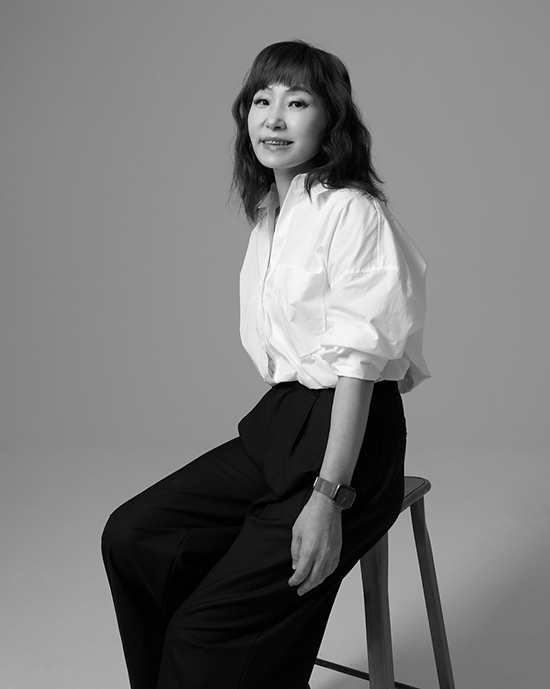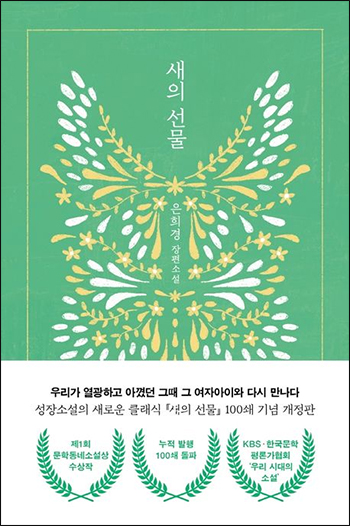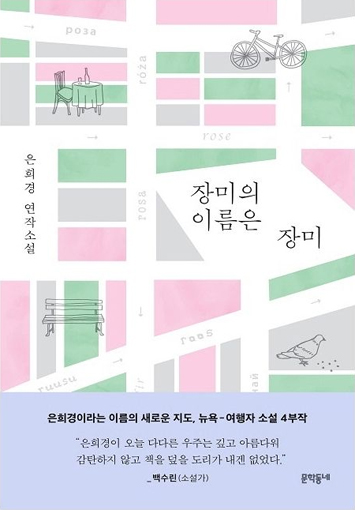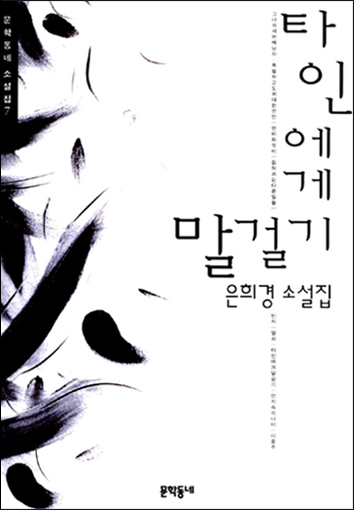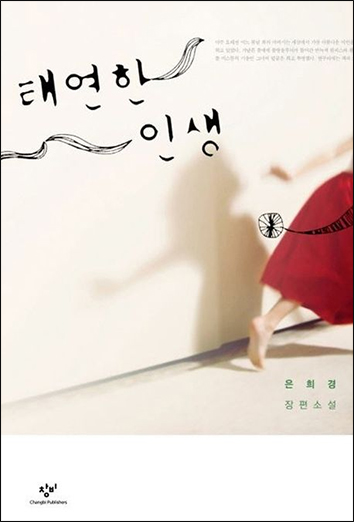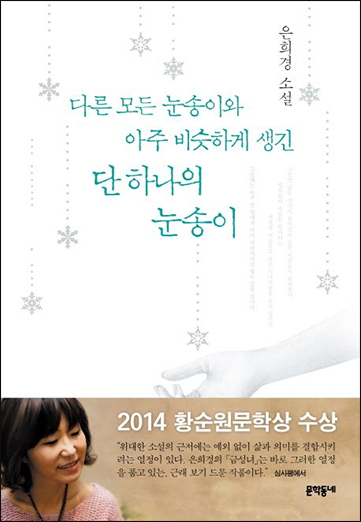|
Korean Authors
Writer Eun Hee-Kyung A Genre Created through Continuous Innovation
2022.11.07
People all look at the world from their own viewpoints and ways of thinking. For that matter, one’s thoughts and notions play important roles in viewing and judging others. Of course, it is not easy to change a deeply rooted mindset. Still, some continue to innovate and move along with the changes in the world. Writer Eun Hee-Kyung, who emphasizes relations and communication with others and looking beyond prejudices, debuted 27 years ago. Still, she does not hesitate to make changes. This time, we met writer Eun Hee-Kyung who delivers warm stories in a slightly cold-blooded manner and has established her works as a unique genre.
ⓒ Seoul International Book Fair (SIBF)

It’s an honor to have you on our webzine. Please say hello to our readers and introduce yourself.
Hello, everyone. I am a novelist, and I debuted in 1995. I have released six full-length novels and eight collections of short stories. Writing a novel is hard every time, and it feels like I am trying it for the first time. However, I continue to write, thinking that becoming a novelist is the luckiest thing to happen to me. For a long time, I was called ‘a writer of cynicism and sharp tongue’, but I always think I write warm novels. Some say I am ‘a self-innovating writer, a genre of its own’, and I like such comments about me.

You recently released a revision of Gift of the Bird (Munhakdongne). It must be meaningful as your first book to reach its 100th printing. After 27 years of your career, it must be impressive as you re-visit your first book, the starting point. How did it make you feel?
Many readers still say the book is my representative piece. Does it mean that I am a writer who can not overcome the first book even after writing for around 30 years? I often joke, “My representative piece is my most recent one because I am getting better and better at writing.” However, as I read through my first book to release a revision, I glimpsed the idea of why readers say the book is my best piece.
Gift of the Bird

You continue to reflect on the changes in the era without sticking to the old way of thinking. It is not easy to change one’s mindset. What makes you continue to ponder and think? Is there any secret of yours in following the trend?
Writers no longer play the role of an intellectual or mentors in the current era. I think novelists are the ones who write stories of people living the time – readers and contemporaries. There were principles that I kept myself committed to as I started writing novels: ‘Write it dry but not sentimental,’ ‘Do not give unfinished resolution and consolation,’ and ‘Do not try to teach readers lessons.’ Even now, I try to see and record people’s lives fairly and accurately, and one has to eliminate one’s bias and continue to renew. You always have to agree that “I could be wrong.”

You were the ambassador at the 2022 Seoul International Book Fair (SIBF). You could meet readers directly through congratulatory remarks, interviews, and lectures. It must have been refreshing, as it’s been three years since SIBF was held due to COVID-19. What was it like to participate in the SIBF as an ambassador?
The book fair was a chance to meet and enjoy the festival for writers and readers. I joined the SIBF several times since its 1st one. Being an ambassador who is a messenger of such a book festival made the experience even more special. This year’s theme was “One Small Step,” meaning that we just started to take new steps as we narrow the distance widened by COVID-19. I was able to sympathize with the fair a lot. There were so many people who participated in the book fair’s lectures and book signing events, which was surprising to me. As a writer and a reader, people “looking for books to read” are like colleagues or friends to me. Regardless, it was pretty embarrassing to see a big picture of me being hung in the event hall.
The Name of a Rose is Rose and Talking to Others

You wrote The Name of a Rose is Rose (Munhakdongne) based on your experience in New York. How are your message and the background of New York connected?
After my first short novel collection, Talking to Others (Dal Publishers), I’ve been writing about relationships and communications among people. “How should one understand others?” We assess others through diverse frames built through our experiences in the social system. Eventually, people have misunderstandings and prejudice, sometimes leading to discrimination and hatred. Literature lets people escape their frames and view others from a new perspective. In the book The Name of a Rose is Rose, I wanted to take the protagonists to an unfamiliar place. In a foreign city, we are judged by our nationality and race, and we get to face ourselves without the barrier we have in our daily lives. In other words, we can see ourselves and others differently.

The Name of a Rose is Rose talks about misunderstandings or prejudice that people easily have. We heard that you looked back at yourself a lot while writing. How can one deal with others without being caught by bias?
I do not think one can fully understand others as each individual is complex and unique. Solitude is a fundamental characteristic of humanity, which we can not get away from. But we can consolidate by respecting differences. The novel measures the distance between one another. We often consider ourselves as the wounded ones. But under the same situation and relation beyond the self-centered filter, you realize that you are also hurting others. I also recognized my prejudice as I made my novel’s main characters go through similar experiences. Writing and reading may all be processes of self-objectification.
Though you can not fully understand others, you can consolidate by respecting differences.

Many say that your literary style, atmosphere, or perspectives have become more well-rounded than the novels written in the early days of your career. Were there any changes in your mind or reasons?
The 1990s was when we had just gotten out of the fight against the military regime in the 1980s. It was the time voices of individuals’ cravings and rights were emerging. Female writers wrote diverse stories. The era was filled with far more prejudice and discrimination, and writers had various ways of raising issues.

You have a long career as a writer. What drove you to work steadily for a long time without stopping?
Sometimes, people ask questions about a slump. I always fall into a slump when I write new pieces. It feels like I am trying it for the first time, and it is challenging. I often feel lost. But such unfamiliarity and curiosity I get as a novice writer keep me attracted to what I do – writing. The world constantly changes, and I live in that era as one of the contemporaries. As long as I feel unfairness and absurdity in the world, questions I want to throw continue to arise.

Your pieces were introduced several times in other countries. Are there any books you would like to recommend to readers overseas?
Gift of the Bird was the most-translated piece. As you can see from the declaration, “Since I knew the world was not benevolent to me, I stopped growing at the age 12,” the book is based on irony. So, it is hard to deliver my message well to readers overseas. Since the full-length novel Life Unperturbed (Changbi Publishers) has even stronger irony, I wonder how readers in other countries would feel about the piece. The collection of short novels The One and Only Snowflake that Looked Like All the Others (Munhakdongne) and The Name of a Rose is Rose are my recent novels. I would like to know whether my viewpoints are delivered well to readers living in different environments.
Life Unperturbed and The One and Only Snowflake that Looked Like All the Others

We heard that you are preparing for your next full-length novel. Please share with us stories about the new book and tell us about your future goals and commitments.
I am writing a full-length novel about our bodies. We are one with our bodies for a lifetime, which is essential in building relationships with others. It also is the starting point of the world’s assessment, distortion, and misunderstanding. I want to show those stories in a novel that reflects on the finiteness of humans from birth to death. I aim to become a “novelist who writes strange stories.” To quote Milan Kundera, life’s charm does not come from an unfamiliar woman showing up, but when a familiar woman feels unfamiliar.
#Eun Hee-Kyung#Gift of the Bird#Seoul International Book Fair#Novelist |
Pre Megazine
-

Jakkajungsin Publishing Co.
VOL.69
2024.04 -

Writer Yun Jung-Eun
VOL.69
2024.04 -

Jumping Books Publishing House
VOL.68
2024.03 -

Writer Kim Hwa-Jin
VOL.68
2024.03 -

Publisher Hyohyung
VOL.67
2024.02 -

Writer Minha
VOL.67
2024.02 -

Almond Publishing
VOL.66
2024.01 -

Writer Kwon Jung-Min
VOL.66
2024.01 -

Hakgojae Publishers
VOL.65
2023.12 -

Writer Kim Hye-Jung
VOL.65
2023.12 -

Eidos Publishing House
VOL.64
2023.11 -

Writer Hwang In-Chan
VOL.64
2023.11 -

Munhakdongne
VOL.63
2023.10 -

Writer Chang Kang-myoung
VOL.63
2023.10 -

Happywell Publishing
VOL.62
2023.09 -

Writer Baik Soulinne
VOL.62
2023.09 -

Dasan Contents Group (Dasan Books)
VOL.61
2023.08 -

Writer Lim Kyoung-Sun
VOL.61
2023.08 -

SpringSunshine Publishing Co.
VOL.60
2023.07 -

Writer Lee Kyung-Hye
VOL.60
2023.07 -

Human Cube
VOL.59
2023.06 -

Doctor Jeong Jae-Seung
VOL.59
2023.06 -

Anonbooks
VOL.58
2023.05 -

Writer Son Bo-Mi
VOL.58
2023.05 -

Namhaebomnal
VOL.57
2023.04 -

Writer Kim Bo-Young
VOL.57
2023.04 -

Hugo Publishing
VOL.56
2023.03 -

Writer Cho Kwang-Hee
VOL.56
2023.03 -

Balgeunmirae Publishing Co.
VOL.55
2023.02 -

Writer Lee Byung-Ryul
VOL.55
2023.02 -

Wisdom House, Inc
VOL.54
2023.01 -

Writer Jeong Jia
VOL.54
2023.01 -

Humanitas
VOL.53
2022.12 -

Writer Kim Yeon-Su
VOL.53
2022.12 -

Songsongbooks
VOL.52
2022.11 -

Writer Eun Hee-Kyung
VOL.52
2022.11 -

Bombom Publishing Co.
VOL.51
2022.10 -

Writer Jiwon Yu
VOL.51
2022.10 -

Hangilsa Publishing Co., Ltd.
VOL.50
2022.09 -

Writer Kim Won-Young
VOL.50
2022.09 -

Moksu Publishing Company
VOL.49
2022.08 -

Writer Yoo Sun-Kyong
VOL.49
2022.08 -

Next Wave
VOL.48
2022.07 -

Writer Park Sang-Young
VOL.48
2022.07 -

A Thousand Hopes
VOL.47
2022.06 -

Writer Bora Chung
VOL.47
2022.06 -

Woongjin ThinkBig
VOL.46
2022.05 -

Dr. Oh Eun-Young
VOL.46
2022.05 -

JECHEOLSO Publishing House
VOL.45
2022.04 -

Writer Jang Ryu-Jin
VOL.45
2022.04 -

Changbi Publishers
VOL.44
2022.03 -

Writer Kim Ho-Yeon
VOL.44
2022.03 -

Mati Books
VOL.43
2022.02 -

Writer Lee Kkoch-Nim
VOL.43
2022.02 -

Picturebook Gongjackso
VOL.42
2022.01 -

Writer Kim Sang-Wook
VOL.42
2022.01 -

Writer So-yeon Park
VOL.42
2022.01 -

Writer Yoo Eun sil
VOL.42
2022.01 -

Kungree Press
VOL.41
2021.12 -

Writer Kim Lily
VOL.41
2021.12 -

Writer Park Yeon-jun
VOL.41
2021.12 -

Writer Yi Hyeon
VOL.41
2021.12 -

A deeper world told through picture books 'Iyagikot Publishing (Story Flower)'
VOL.12
2019.06 -

Author Jeon Min-hee
VOL.12
2019.06 -

Illustrator Kim Hwan-Young
VOL.13
2019.07 -

Travelers sailing through the sea of knowledge - 'Across Publishing Group Inc.'
VOL.13
2019.07 -

Genre Novel Publisher 'Arzak Livres'
VOL.14
2019.08 -

Author Lee Yong-han
VOL.14
2019.08 -

Wookwan Sunim
VOL.15
2019.09 -

East-Asia Publishing
VOL.15
2019.09 -

Author Jo Jung-rae
VOL.16
2019.10 -

EunHaeng NaMu Publishing
VOL.16
2019.10 -

Writer Heo Kyo bum
VOL.40
2021.11 -

Writer Kim So-Young
VOL.40
2021.11 -

Author-illustrator Kim Sang Keun
VOL.40
2021.11 -

ACHIMDAL BOOKS
VOL.40
2021.11 -

Author Kang Gyeong-su
VOL.17
2019.11 -

Moonji Publishing Belongs to the Literary Community
VOL.17
2019.11 -

Author Kim Yun-jeong
VOL.18
2019.12 -

I-Seum
VOL.18
2019.12 -

Kim Cho-Yeop
VOL.19
2020.02 -

Creating a window into the future with books
VOL.19
2020.02 -

Author Serang Chung
VOL.20
2020.03 -

Hey Uhm
VOL.20
2020.03 -

Writer Lim Hong-Tek
VOL.21
2020.04 -

BIR
VOL.21
2020.04 -

Writer Song Mikyoung
VOL.39
2021.10 -

Author-illustrator Kim Dong Su
VOL.39
2021.10 -

Writer Lee Seula
VOL.39
2021.10 -

Tabi Books
VOL.39
2021.10 -

Writer Kim Soo-hyun
VOL.38
2021.09 -

Author-illustrator Lee Myoung Ae
VOL.38
2021.09 -

Writer Hwang Sunmi
VOL.38
2021.09 -

Kidari Publishing Co.
VOL.38
2021.09 -

Writer Sohn Won-Pyung
VOL.22
2020.05 -

Woods of Mind's Books
VOL.22
2020.05 -

Writer Heungeul
VOL.23
2020.06 -

Gloyeon
VOL.23
2020.06 -

Maumsanchaek
VOL.24
2020.07 -

Winners of the 2021 Bologna Ragazzi Award
VOL.37
2021.08 -

Picture book artist Lee Suzy
VOL.37
2021.08 -

Author-illustrator Yi Gee Eun
VOL.37
2021.08 -

Hubble
VOL.37
2021.08 -

Writer Baek Se-Hee
VOL.25
2020.08 -

Bearbooks Inc.
VOL.25
2020.08 -

Author Baek Hee-Na
VOL.26
2020.09 -

Yuksabipyoungsa
VOL.26
2020.09 -

Writer Kang Hwa-Gil
VOL.27
2020.10 -

Kinderland (Bandal)
VOL.27
2020.10 -

Writer Ha wann
VOL.36
2021.07 -

Author-illustrator Myung Soojung
VOL.36
2021.07 -

Writer Jung Yeo-Wool
VOL.36
2021.07 -

Publisher EcoLivres
VOL.36
2021.07 -

Writer Lee Geumi
VOL.28
2020.11 -

Sakyejul
VOL.28
2020.11 -

Writer Kim Keum-Hee
VOL.29
2020.12 -

Geulhangari
VOL.29
2020.12 -

Writer Cheon Seon-Ran
VOL.30
2021.01 -

Hyang Publishing House
VOL.30
2021.01 -

Writer Lee Hee-Young
VOL.31
2021.02 -

Sanzini
VOL.31
2021.02 -

Publisher Prunsoop
VOL.32
2021.03 -

Writer Sim Yun-Kyung
VOL.32
2021.03 -

Hanbit Media
VOL.35
2021.06 -

Hyeonamsa
VOL.33
2021.04 -

Author-illustrator Noh Inkyung
VOL.33
2021.04 -

Writer Cho Won-Jae
VOL.35
2021.06 -

Writer Kim Jung-Mi
VOL.34
2021.05 -

Safehouse Inc.
VOL.34
2021.05


